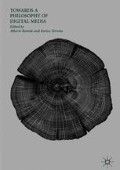Abstract
Writing is frequently analyzed as a mode of communication. But writing can be done for personal reasons, to remind oneself of things to do, of thoughts, of events. The cellphone has revealed this shift, commencing as a communication device and ending up (at the moment) as a memory prosthesis that records what we see, hear, read and think. The recordings are not necessarily for communicating a message to others, but sometimes just for oneself. Today, when machine learning algorithms read, write and transmit, a new mode of communication arises that is not centered on the human. In this chapter the various phases of modern writing are modeled according to postphenomenology. As a branch of philosophy of technology, postphenomenology offers a set of analytical tools to study technologies and our relations to them. One of its central frameworks is the scheme of “I–technology–world.” The author proposes some modifications so that the scheme can systematically model the changes in the humans users, in machine learning algorithms imbued with non-human cognition and in the environments of readers, interlocutors and contexts.
Access this chapter
Tax calculation will be finalised at checkout
Purchases are for personal use only
References
Feenberg, Andrew. 2006. Active and Passive Bodies: Don Ihde’s Phenomenology of the Body. In Postphenomenology: A Critical Companion to Ihde, ed. Evan Selinger, 189–196. Albany, NY: SUNY Press.
Flew, Terry. 2008. New Media: An Introduction. Oxford: Oxford University Press.
Forss, Anette. 2012 Cells and the (Imaginary) Patient: The Multistable Practitioner–Technology–Cell Interface in the Cytology Laboratory. Medicine, Health Care and Philosophy 15 (3, Aug.): 295–308.
Goody, Jack. 1977. The Domestication of the Savage Mind. Cambridge: Cambridge University Press.
Heidegger, Martin. 1992. Parmenides. Bloomington and Indianapolis: Inidiana University Press.
Ihde, Don. 1990. Technology and the Lifeworld. From Garden to Earth. Bloomington and Indianapolis: Indiana University Press.
———. 2010. Heidegger’s Technologies. Postphenomenological Perspectives. New York: Fordham University Press.
———. 2015. Preface: Positioning Postphenomenology. In Postphenomenological Investigations: Essays on Human-Technology Relations, ed. Robert Rosenberger and Peter-Paul Verbeek, vii–xvi. Lanham: Lexington Books.
Irwin, Stacey O’Neal. 2016. Digital Media. Human–Technology Connection. Lanham: Lexington Books.
Just, Natascha, and Michael Latzer. 2017. Governance by Algorithms: Reality Construction by Algorithmic Selection on the Internet. Media, Culture & Society 39 (2): 238–258.
Liberati, Nicola. 2016. Augmented Reality and Ubiquitous Computing: the Hidden Potentialities of Augmented Reality. AI & Society 31 (1): 17–28.
Manovich, Lev. 2001. The Language of New Media. Cambridge and London: The MIT Press.
———. 2013. Software Takes Command. New York and London: Bloomsberry Academics.
Rosenberger, Robert. 2008. Perceiving Other Planets: Bodily Experience, Interpretation, and the Mars Orbiter Camera. Human Studies 31: 63–75.
Rosenberger, Robert, and Peter-Paul Verbeek. 2015. A Field Guide to Postphenomenology. In Postphenomenological Investigations: Essays on Human-Technology Relations, ed. Robert Rosenberger and Peter-Paul Verbeek, 9–41. Lanham: Lexington Books.
Van Den, Eede. 2012. Yoni. Amor Technologiae. Marshall McLuhan as Philosopher of Technology—Toward a Philosophy of Human-media Relationships. Brussels: VUBPress.
Verbeek, Peter-Paul. 2008. Cyborg intentionality. Rethinking the Phenomenology of Human–Technology Relations. Phenomenology and Cognitive Science 7: 387–395.
Wellner, Galit. 2011. Wall-Window-Screen: How the Cell Phone Mediates a Worldview for Us. Humanities and Technology Review 30: 77–104.
———. 2014. The Quasi-Face of the Cell Phone. Rethinking Alterity and Screens. Human Studies 37 (3): 299–316.
———. 2015. A Postphenomenological Inquiry of Cell Phones. Genealogies, Meanings, and Becoming. Lexington Books.
———. 2017. I-Media-World. The Algorithmic Shift from Hermeneutic Relations to Writing Relations. In Postphenomenology and Media: Essays on Human–Media–World Relations, ed. Yoni Van den Eede, Stacey Irwin, and Galit Wellner, 207–228. Lanham: Lexington Books.
Wiltse, Heather. 2014. Unpacking Digital Material Mediation. Techné: Research in Philosophy and Technology 18 (3): 154–182.
Author information
Authors and Affiliations
Editor information
Editors and Affiliations
Rights and permissions
Copyright information
© 2018 The Author(s)
About this chapter
Cite this chapter
Wellner, G. (2018). From Cellphones to Machine Learning. A Shift in the Role of the User in Algorithmic Writing. In: Romele, A., Terrone, E. (eds) Towards a Philosophy of Digital Media. Palgrave Macmillan, Cham. https://doi.org/10.1007/978-3-319-75759-9_11
Download citation
DOI: https://doi.org/10.1007/978-3-319-75759-9_11
Published:
Publisher Name: Palgrave Macmillan, Cham
Print ISBN: 978-3-319-75758-2
Online ISBN: 978-3-319-75759-9
eBook Packages: Religion and PhilosophyPhilosophy and Religion (R0)

